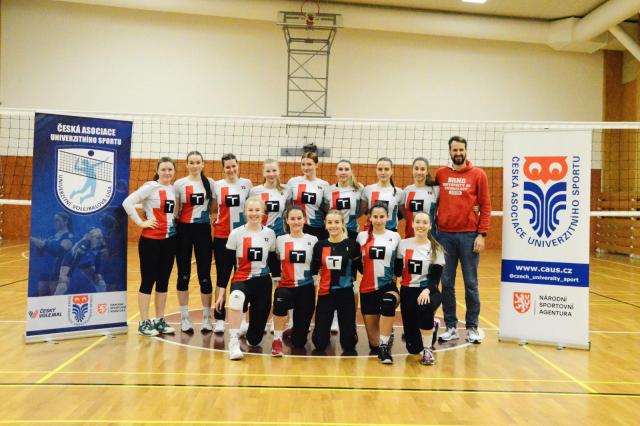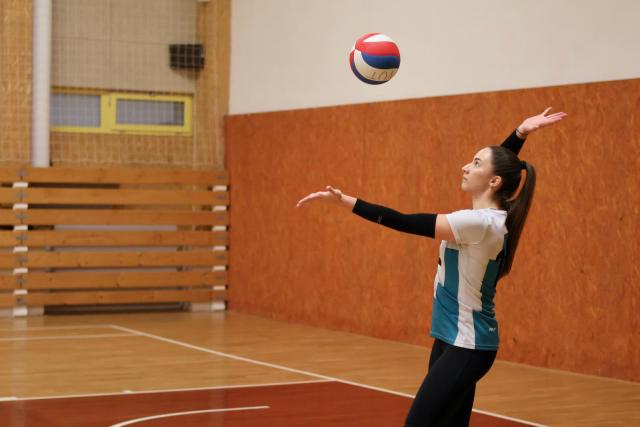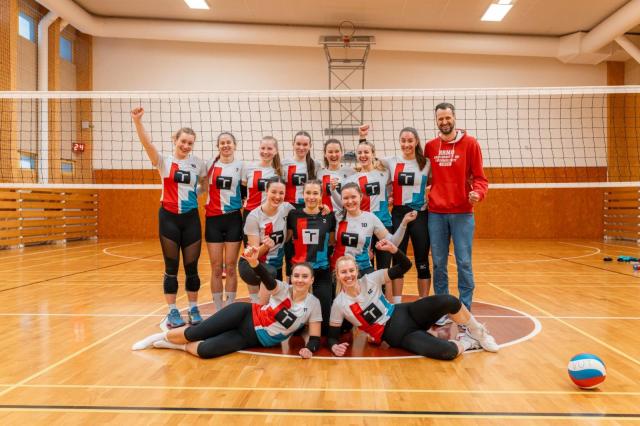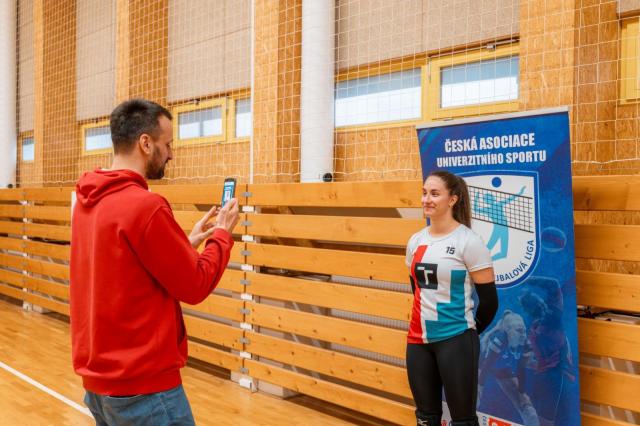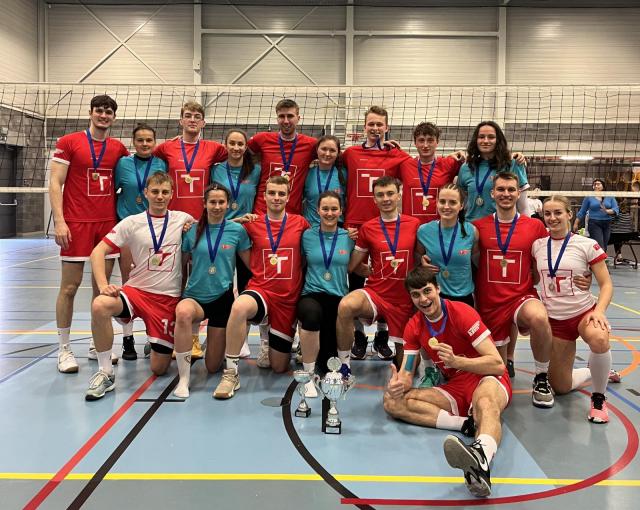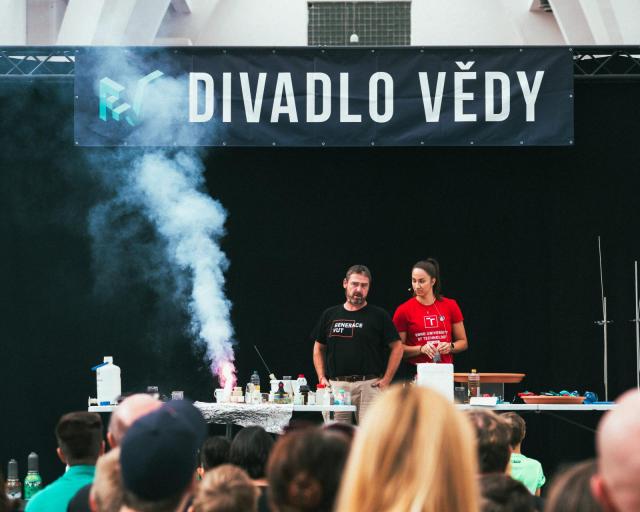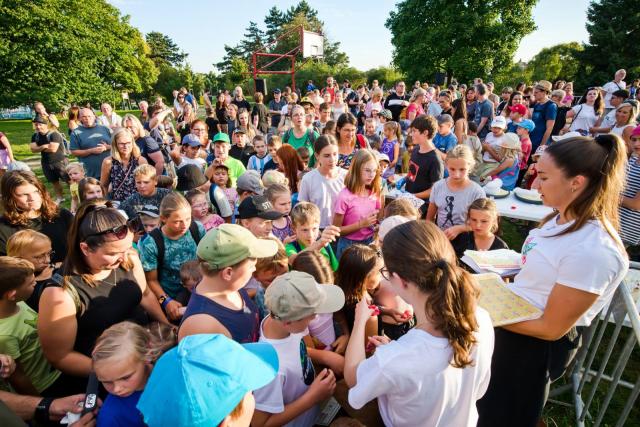“Sport taught me not to give up,” says student Kateřina Provazníková
Chemistry and volleyball – two seemingly different worlds that Kateřina holds firmly in her hands. In the interview, she talks about how she manages to balance demanding studies with international athletic success, why sport is an anchor and a source of support for her, and what the atmosphere is like in the university team. She recalls foreign championships with enthusiasm and also speaks openly about what led her to study chemistry.
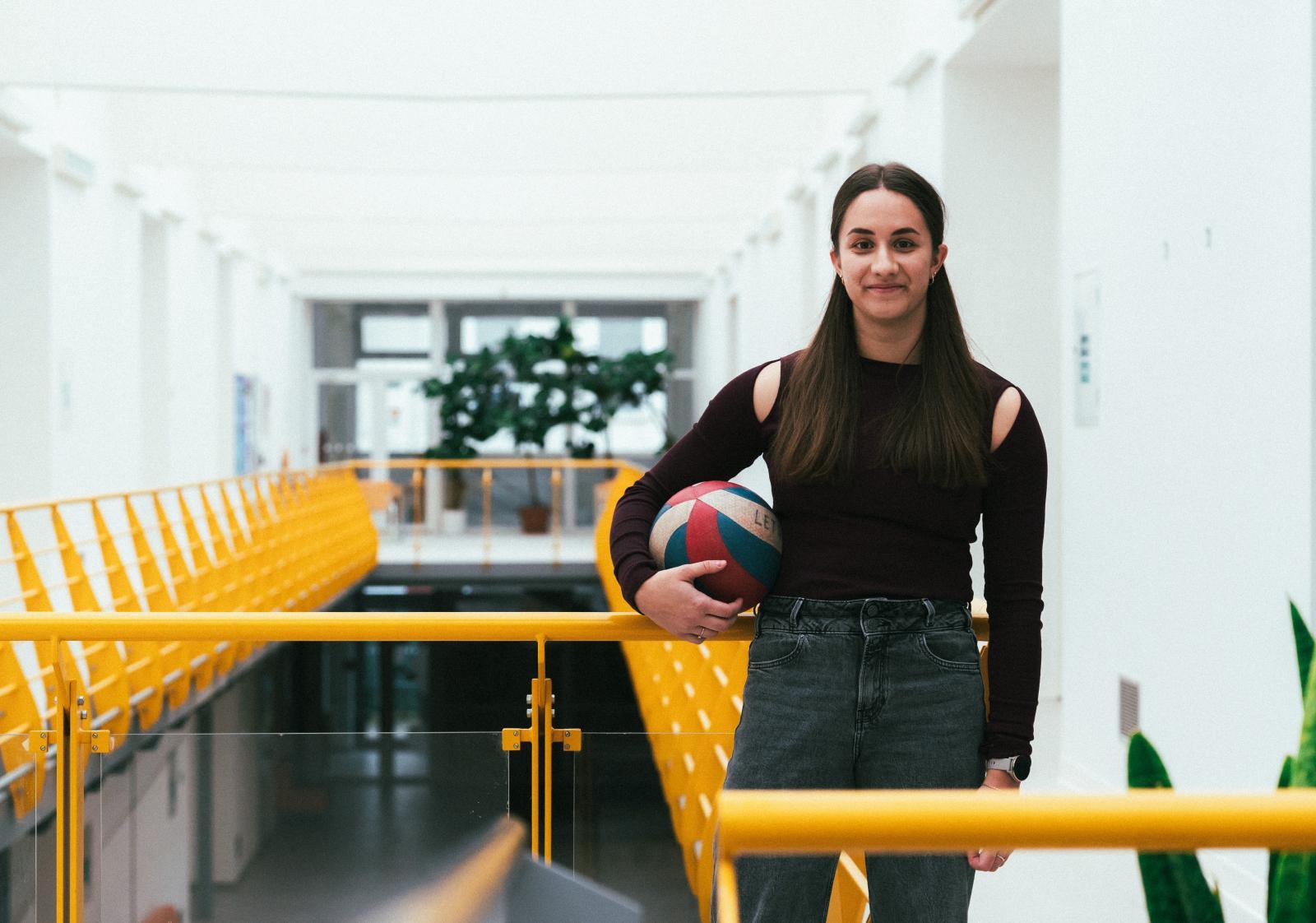
I’ve been playing volleyball since I was little, maybe from the age of five or six, because almost everyone in my family plays it. So I’ve been close to it since childhood. I joined the university team partly thanks to my teammates from the club I was playing for at the time, and partly through my brother, who was already on the team while studying at the Faculty of Mechanical Engineering.
And already in my first year, in November, I had the chance to go with the team to Barcelona for the World University Championship. That’s not very common – usually only players who have been on the team longer go to these tournaments, but I made it there in my first year. It was something new – a different level, a different atmosphere. In the end, we won the entire tournament in Barcelona and finished first in the world. And a fun fact – Czech universities took all three top places, which shows just how high the level of Czech volleyball is. It was an incredible experience I’ll never forget.
What expectations did you have going into the tournament?
I remember that we had no idea what to expect. We started our first match almost without a warm-up, everything there was different from what we knew – and we won right away. Step by step, we made it all the way to the finals, and by then the entire BUT was cheering for us. Even the other sports teams that were there. During the ceremony they played “We Are the Champions” by Queen, confetti was falling and we received a huge trophy – it must have been a meter tall. It was unbelievable. Later, we were sitting at the airport, exhausted, green from fatigue after the celebrations, with the trophies and medals in front of us, and people were stopping and staring… (laughs).
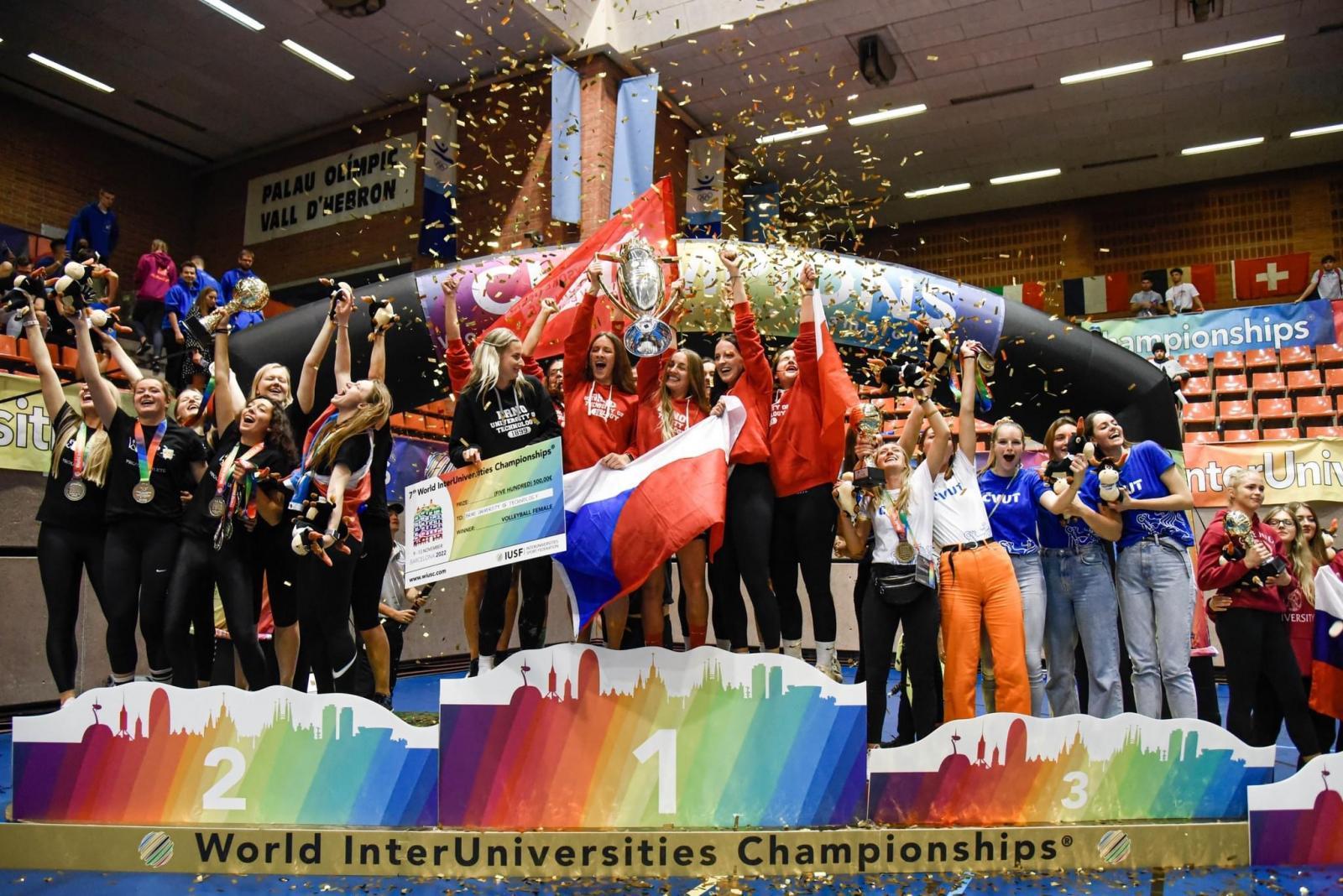
It’s great. We come together with girls from various faculties across BUT. I’m not the only one from our faculty – Sabina Dunajská, Daniela Moudrá and Adéla Brdičková are on the team with me. We train once a week and alternate between ball practice and the gym. It’s a nice way to relax – we meet, play, and enjoy it. When we play matches, of course we want to win, but the main thing is to have fun. The atmosphere is friendly, no one argues, we mostly hype each other up and support one another.
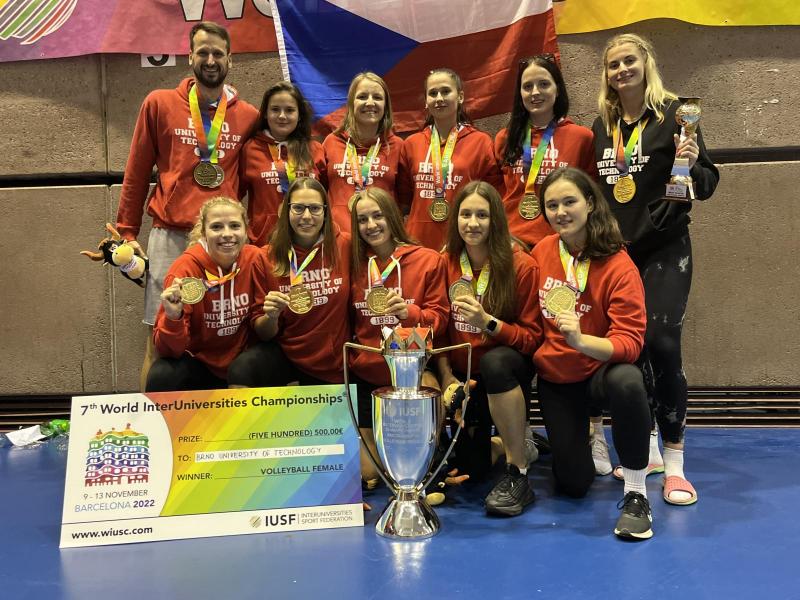
Every year we play in the University League, where we compete against universities such as Mendel University, Masaryk University, the University of Defence or, this year, the University of Chemistry and Technology in Prague. At the end of the semester, there is a larger final tournament.
As I mentioned, in my first year we went to Barcelona and won the World Championship. Then we went to Antwerp, where we competed at the European level and finished second. Once again, a Czech university beat us.
Last year we went to Switzerland, where we won by a landslide – we practically had no competition. And this year we’re heading to Estonia for another European tournament. Each tournament has a completely different atmosphere, but they’re all fantastic. We always meet other sports teams from BUT – basketball, futsal or even frisbee. We cheer for each other.
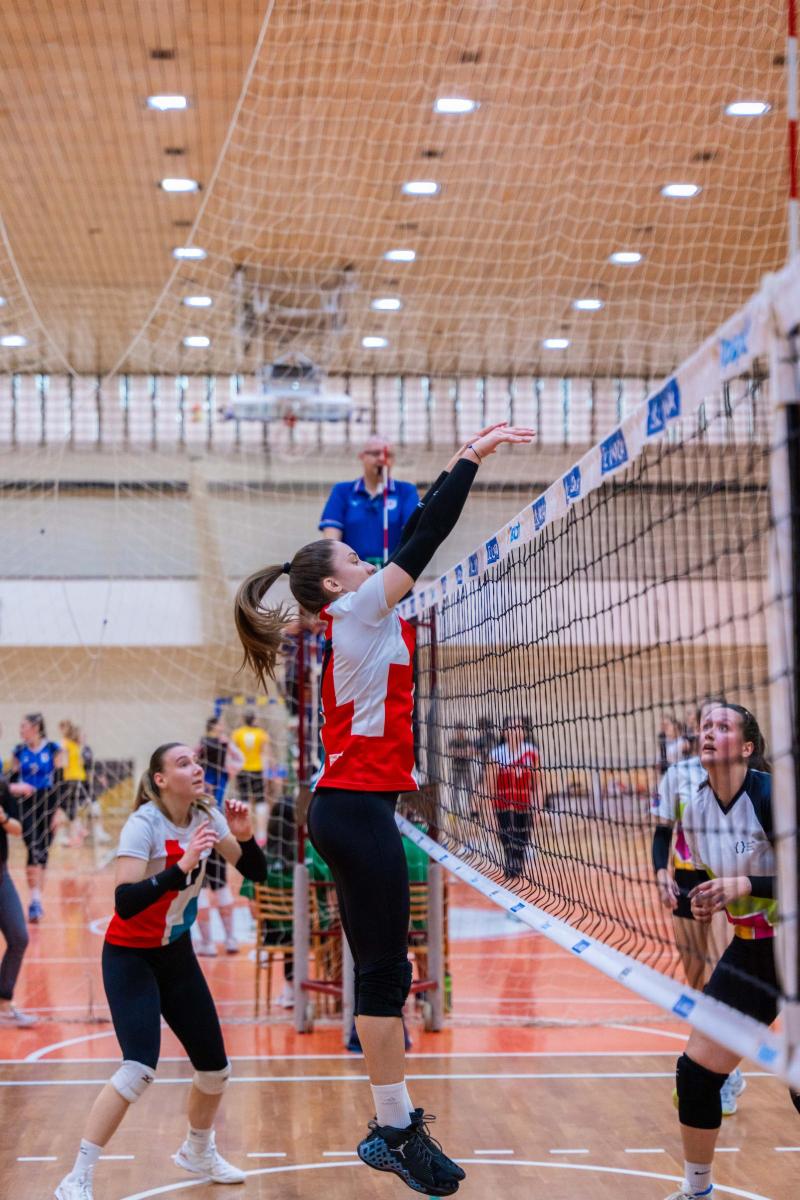
Sometimes it’s tough, because I get home from training at around ten in the evening and then wake up early for school, but it’s manageable. Studying chemistry is not exactly easy, but volleyball helps me switch off. When something at school upsets me, I go to training and immediately feel better. I don’t have much free time, but if you plan well, you can manage everything.
Does sport help you with your studies?
I think it does. What I take from sports the most is that I don’t give up. I don’t want to lose – and that helps me at school too. Before an exam I sometimes think: “I won’t make it,” but right after that I tell myself: “You must pass it on the first try, you don’t want to take it again.” So perseverance, discipline and determination – that definitely comes from volleyball.
I’m very lucky that my supervisor, Dr Smilek, supports me in sports. Probably because he himself is a passionate athlete. When I was going to a tournament and we had a practical class scheduled at the same time, he always allowed me to go. He even let me go to the tournament in Switzerland right before the bachelor’s thesis deadline. He was totally calm about it and just said: “Of course, go and bring back a medal!”

In high school I mainly enjoyed maths, but I didn’t want to study just maths. I never wanted to become a teacher and pure maths probably wouldn’t have fulfilled me. I had a great chemistry teacher, so I took a chemistry seminar to see if I liked it – and I ended up enjoying it a lot.
Then I was looking for something that would let me combine maths and chemistry. I knew that BUT had a Faculty of Chemistry, and another plus was that there were no entrance exams. I get stressed easily, and during my A-levels I didn’t want to deal with entrance exams as well.
I enrolled in the bachelor’s programme Chemistry for Medical Applications because my mum really wanted one of her children to go into medicine. My brother went to Mechanical Engineering, so it was clear he wouldn’t become a doctor. My mum told me: “If you want to go to BUT, then at least go for medical applications.” So I did. But then I found out that I wasn’t that interested in biology and that I’d prefer something more towards physical chemistry. My bachelor’s thesis opened my eyes too, so for my master’s I chose Chemistry and Chemical Technologies.
What do you enjoy most about this field?
Mainly physical chemistry, specifically hydrogels. I worked on hydrogels for my bachelor’s thesis and now I can continue with it, just not as much in the medical direction. I enjoy how they can be used for almost anything – people often don’t realise that even such ordinary things as gel toilet fresheners are actually hydrogels too.
What do you consider your biggest academic achievement? And what challenged you the most?
Definitely my bachelor’s thesis and the final state exams. I’m proud of myself for having earned my first degree. Looking back, the first year wasn’t that difficult, but it was a big jump – suddenly lots of exams, two exam periods a year, a completely different rhythm. That stressed me out the most. The state exams were then “just” another exam – except there were more people sitting in front of me, and the next attempt would have been almost a year later.
How would you describe the atmosphere at the faculty?
It’s very family-like. The faculty isn’t big, so people know each other. When I walk out of a lecture, I always meet someone, we stop and chat. I also know the PhD students, because they consulted our bachelor’s theses or we met them at the institute.
At the institute we have a group of “hydrogel people” – those who work on hydrogels. I see that as my little “home”.
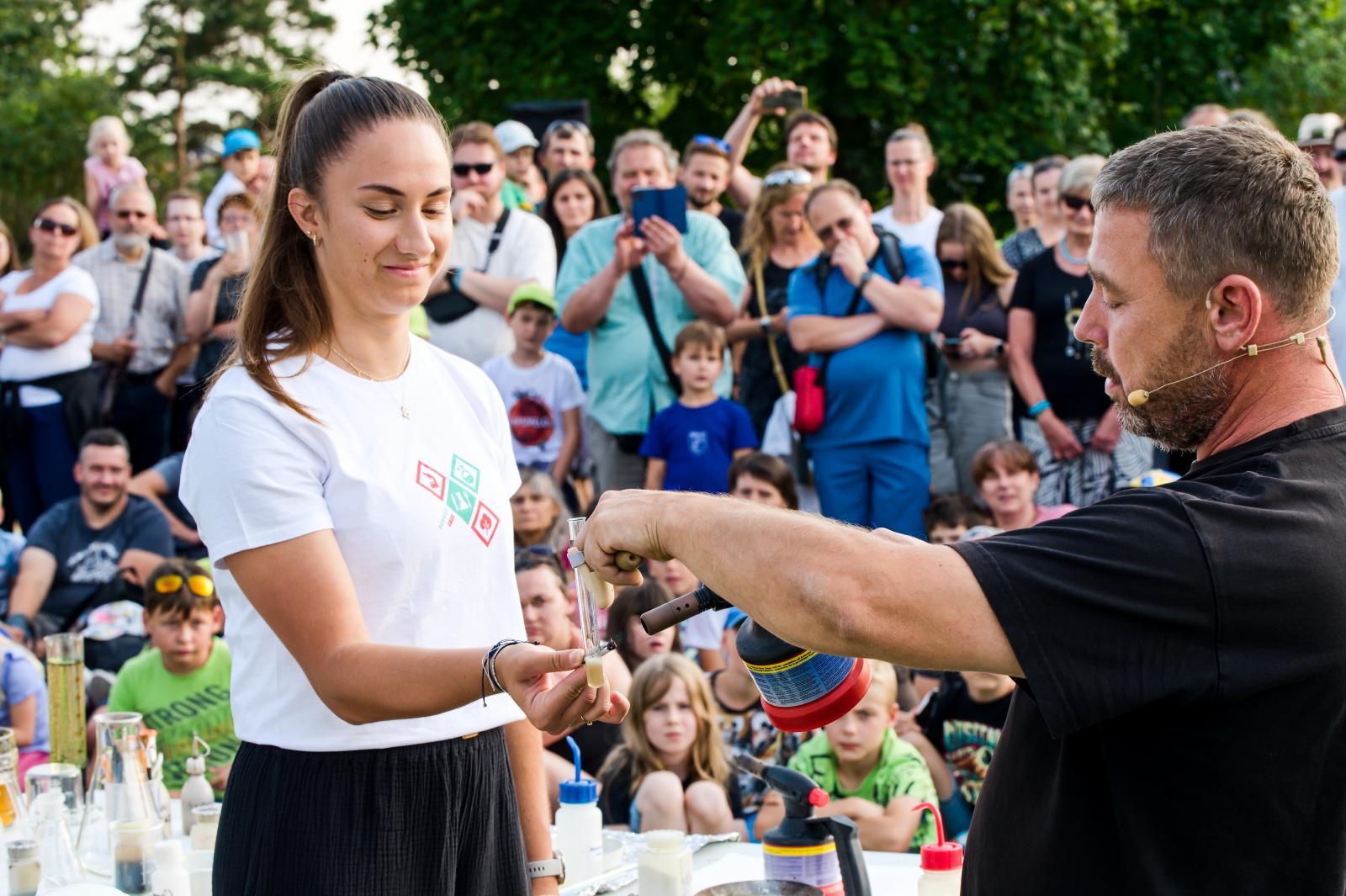
When the opportunity came up, I thought I’d give it a try. It was a step into the unknown, but we started helping with chemistry shows with Associate Professor Tomáš Opravil, and he’s a lot of fun! And why is it important? Because people should see that chemistry can be fun. And above all – so they understand that chemistry is everywhere around us and that many things we take for granted couldn’t exist without it. At the faculty we do a lot of ecological, sustainable and modern things, and it’s nice to show that to people. We want them to know that chemistry isn’t something to be afraid of, but something with a huge practical impact.
Which moment from these events stands out the most for you?
I often think back to the Planet Festival at the observatory. We did a group experiment called “Magic Pot, Cook!” – elephant toothpaste, where a lot of people from the audience got involved. It was great fun. But the Gaudeamus fair was also fantastic – we could tell high-schoolers what it’s like here, reassure them that it’s not that scary, that if you set a good routine, you can manage your studies and still have free time.
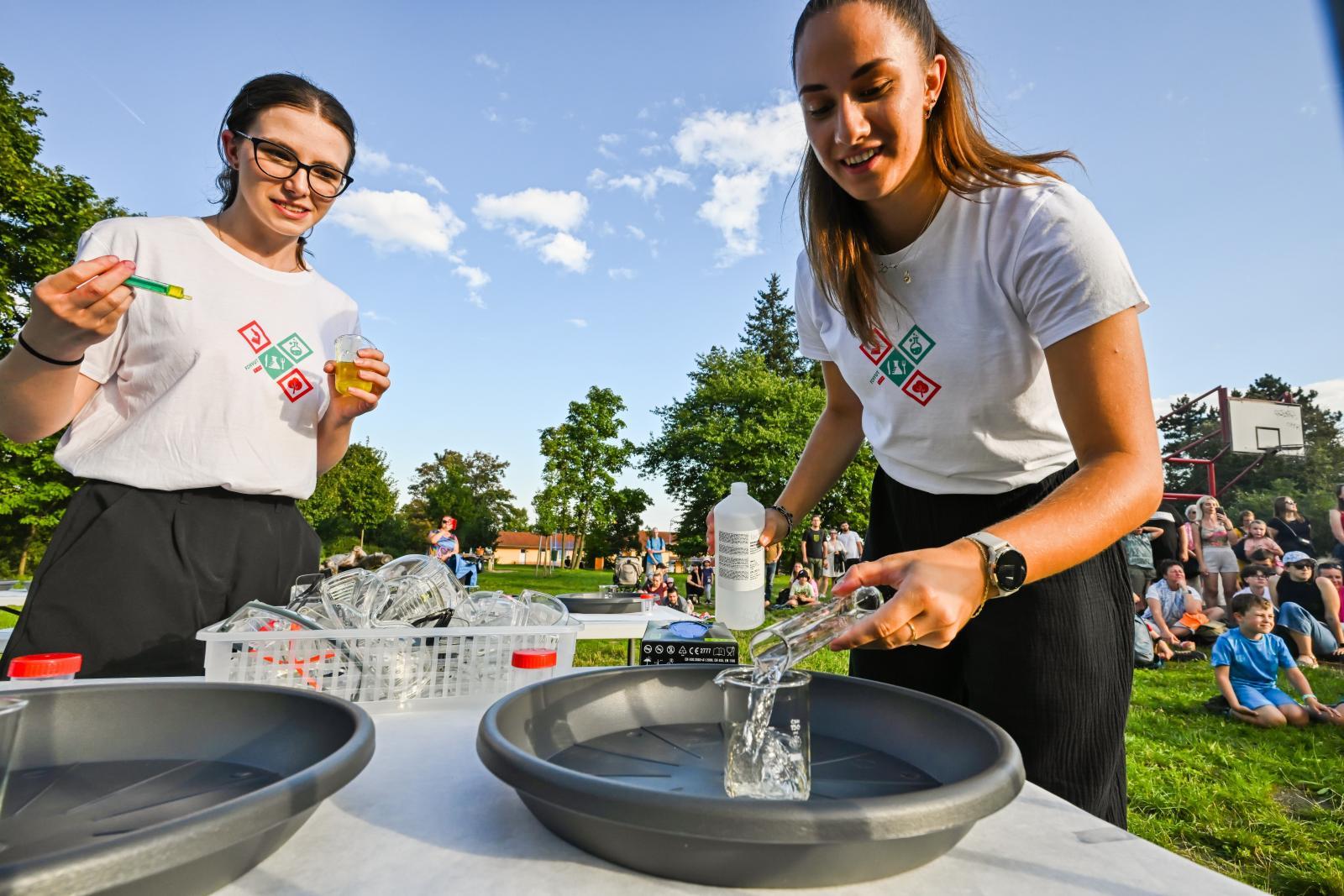
I think so. When they see experiments live, they often become fascinated – they suddenly understand what we do in the labs. For us it may be banal: you pour something, it reacts, foam or colour appears… but for the public it’s a wow moment. And they also realise that chemistry isn’t just theory. From the first year on, we are constantly in the labs, trying new things, learning to experiment – and many people don’t realise that. Thanks to outreach events, they see that chemistry can be genuinely fun and that it requires a lot of work and creativity.
Apart from studying and sports, you also tutor mathematics. What led you to that?
I’ve enjoyed maths since primary school. I used to go to various competitions and it was never a problem for me. Through a friend I started tutoring for entrance exams for grammar schools – we have fifth, seventh and ninth graders. We teach in groups of up to fifteen children. Some kids are very talented, others are there because their parents want them to be.
I like teaching the fifth-graders the most – they’re honest, not shy, they raise their hands, they say what they think. Ninth-graders are different, you’re almost talking to yourself then. (laughs)
What are your plans for the future?
Honestly, I’m not completely sure yet. I’d like to find a job that I enjoy. There’s also the possibility of doing a PhD. My mum and my supervisor, Dr Smilek, already take it as a done deal. (laughs) And I think: why not – I can learn a lot, maybe even go abroad.
And what would you say to those considering studying chemistry?
Not to be afraid of it. It’s challenging, but it’s worth it. Chemistry is everywhere and there are always new things to discover.
-lv-
| Published | |
|---|---|
| Link | https://www.fch.vut.cz/en//f96620/d309666 |
